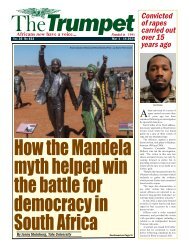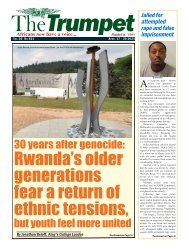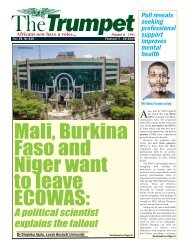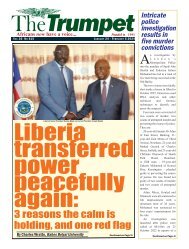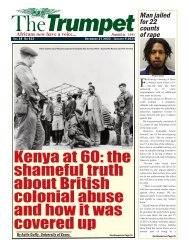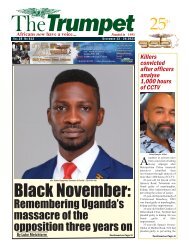The Trumpet Newspaper Issue 624 (May 29 - June 11 2024)
South Africans go to the polls to choose a new government: what's different this time
South Africans go to the polls to choose a new government: what's different this time
You also want an ePaper? Increase the reach of your titles
YUMPU automatically turns print PDFs into web optimized ePapers that Google loves.
Page12 <strong>The</strong><strong>Trumpet</strong> MAY <strong>29</strong> - JUNE <strong>11</strong> <strong>2024</strong><br />
Opinion<br />
Celebrating Ken Calebs<br />
Olumese, <strong>The</strong> Guv’nor, at 80<br />
By Reuben Abati<br />
Yesterday, <strong>May</strong> 27, one of<br />
Nigeria’s iconic figures in the<br />
entertainment sector turned<br />
80: Ken Calebs Olumese, an Esan man<br />
from the university town of Ekpoma<br />
as he likes to describe his home town<br />
of which he is proud, as if every other<br />
town these days does not have a<br />
university but in those days when a<br />
university was established in Ekpoma<br />
(1981), it was such a thing of pride and<br />
achievement that Olumese took upon<br />
himself as a personal badge. But the<br />
real story about him and his life is his<br />
immense contributions to the cultural<br />
space in Nigeria, the impact that he<br />
has made in turning music, art, song,<br />
food, drinks, space and dance into<br />
entrepreneurial tools for the promotion<br />
of social cohesion, inclusion,<br />
solidarity, creativity and pure fun. He<br />
was the Don Cornelius, without the<br />
controversy, of the night club scene<br />
and entertainment arena in Lagos in<br />
the 80s and 90s. He was colourful,<br />
charismatic, decent, debonair, affable,<br />
and quite astute in making friends, and<br />
building bridges and relationships. In<br />
the Opebi, Ikeja area where he ran a<br />
nightclub that was famously known as<br />
Niteshift Coliseum, he was a lord of<br />
the territory, father of the kids on the<br />
streets and friend of the gentrified<br />
class with an understanding of the<br />
register of social and communal<br />
survival beyond the pale of regular<br />
entrepreneurship. He moved with a<br />
swag. He strutted with poise. He was<br />
the Guv’nor: who never went on<br />
transfer, or had to seek seasonal<br />
elections, or go on break, he was his<br />
own constituted authority running an<br />
entertainment empire. <strong>The</strong> phrase<br />
Guv’nor was first used in the 1840s, a<br />
variant of the more popular noun -<br />
Governor, but over time, it would gain<br />
resonance as the title of a film in 1935,<br />
and as the nickname of a number of<br />
sports figures – Diego Costa, Bobby<br />
Abel, Paul Ince, Lenny McLean.<br />
When Ken Calebs Olumese<br />
established the Niteshift club in Opebi,<br />
Lagos in 1988, he took the title as<br />
label, brand and cognomen, and thus<br />
began a fresh chapter in the<br />
entertainment story of the city of<br />
Lagos.<br />
Ken Calebs Olumese did not invent<br />
nightlife in Lagos, but he helped for<br />
about two decades to shape and enrich<br />
Ken Calebs Olumese (Photo - Reuben Abati on Instagram)<br />
it. <strong>The</strong> people of Lagos, being Yorubas<br />
are naturally fun-loving, and having<br />
fun at night time has been part of their<br />
culture even before the Victorian times<br />
in the 19 th century, aspects of which<br />
have been examined at great length by<br />
Professor Michael J.C. Echeruo in a<br />
book titled “Victorian Lagos.” <strong>The</strong><br />
city that became known as “<strong>The</strong><br />
Liverpool of West Africa” in the 19 th<br />
Century, an emerging commercial,<br />
port city was also a community of<br />
persons and cultural developments,<br />
including the media, culture and<br />
nationalism. Lagosians love the good<br />
life. <strong>The</strong>y enjoy the thrill of evening<br />
fun be it at the beach, or at the clubs,<br />
or on the streets of Ebute Metta where<br />
there used to be a party every evening,<br />
or anywhere else where the people<br />
could dance to highlife. By his own<br />
account, Ken Calebs Olumese arrived<br />
in Lagos in the late 60s or early 70s<br />
just like many of these persons from<br />
the hinterland who continue to troop<br />
into Lagos on a daily basis. Thousands<br />
arrive daily from all parts of Nigeria,<br />
very few go back to where they came<br />
from, indeed over time, they become<br />
part of the Lagos ecosystem, get lucky<br />
and excel. In Olumese’s case, when he<br />
left Ekpoma, he lived in Benin. He got<br />
involved in the Socialist Movement,<br />
which was quite a rave in Nigeria’s<br />
70s, the season of the cold war. He<br />
would eventually gain a scholarship to<br />
study Medicine in the Soviet Union.<br />
Many young Nigerians went to the<br />
Soviet Union at the time. <strong>The</strong> then<br />
young Ken Calebs Olumese returned<br />
with a degree in Microbiology. By<br />
1977, he, with the help of his kinsman,<br />
Chief Anthony Enahoro, played some<br />
role in the arrangements for FESTAC<br />
77, his first major direct involvement<br />
in cultural diplomacy. He was also<br />
closely associated with the likes of Dr<br />
Tunji Otegbeye, trade unionist,<br />
medical doctor and leader of the<br />
Socialist Workers and Farmers Party<br />
of Nigeria (SWAFP). <strong>The</strong> most<br />
notable part of that phase of his return<br />
is not necessarily FESTAC 77,<br />
however but the fact that he eventually<br />
ended up as a Sales Representative<br />
with the French Pharmaceutical<br />
Company - Roussel, where he rose<br />
through the ranks to become the<br />
Director of Administration and<br />
Finance. Olumese was like the rest of<br />
us: waking up in the morning,<br />
pursuing the nine to five hustle,<br />
struggling like everyone else to raise a<br />
family. He had a good career.<br />
It is one of those ironies of life that<br />
he would eventually become famous<br />
through his hobby, rather than his<br />
vocation. In 1988, he decided to set up<br />
a Night Club at 21 Opebi Street with a<br />
corporate office at 5, Ogundana Street,<br />
off Opebi Road, marking Olumese’s<br />
transition into the arena of<br />
entrepreneurship, from selling<br />
pharmaceutical products, to the retail<br />
of songs, food, drinks, and whatever<br />
brings joy. He had been a prolific<br />
nightlife denizen himself. He turned<br />
his interest into a passion and his<br />
passion into business. When Olumese<br />
arrived on the nightclub scene in Ikeja<br />
and Lagos in the 80s, there was<br />
already a thriving, habitual ecosystem<br />
in place. From Idi-oro in Mushin, to<br />
Jibowu, Ayilara and Ojuelegba, there<br />
was a buzzing axis of nightlife<br />
entertainment. In Ikeja, Ipodo,<br />
Awolowo Road, Allen and Opebi<br />
streets came alive similarly at sun<br />
down. <strong>The</strong>re was a gentleman called<br />
Omieba Dan Princewill, he ran two<br />
clubs – City Tavern and Daniel’s.<br />
<strong>The</strong>re was the colourful, stand-up<br />
comedian, John Chukwu who owned<br />
a club called Klass, with Eddie Jay<br />
Omodiagbe as Dee Jay. <strong>The</strong>re was<br />
Ozone owned by Jibola Shitta-Bey on<br />
Allen Avenue. <strong>The</strong>re was also at some<br />
point, De Roof, Singer’s Cruise, Bread<br />
Continued on Page 14






